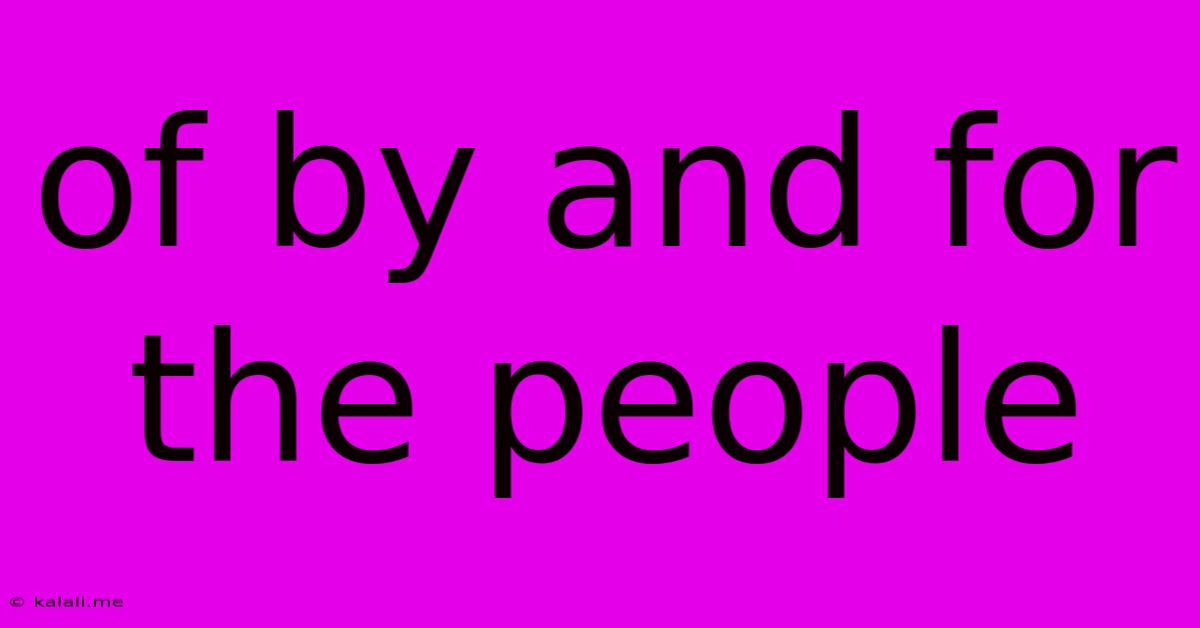Of By And For The People
Kalali
May 31, 2025 · 4 min read

Table of Contents
Of, By, and For the People: A Deep Dive into the Meaning and Modern Application of Democracy
The phrase "government of the people, by the people, for the people" is arguably the most iconic articulation of democracy. This simple yet powerful statement, enshrined in Abraham Lincoln's Gettysburg Address, encapsulates the ideal of a government whose legitimacy stems from the consent of the governed. But what does this truly mean in practice, and how does it apply to the complexities of the modern world? This article explores the core tenets of this democratic ideal, examining its historical context, its contemporary challenges, and its ongoing relevance.
Understanding the Tripartite Nature of "Of, By, and For"
Lincoln's concise phrasing beautifully highlights three interconnected aspects of a truly democratic government:
-
Of the people: This refers to the source of the government's authority. A government "of the people" is one whose power originates from the citizens themselves, not from divine right, heredity, or force. This implies popular sovereignty, where the ultimate power rests with the populace. This principle is manifested through free and fair elections, where citizens choose their representatives. Furthermore, it necessitates active citizen participation in the political process through voting, advocacy, and civic engagement.
-
By the people: This highlights the participatory nature of democratic governance. A government "by the people" is one where citizens have a direct or indirect role in shaping their government's policies and decisions. This can be achieved through various mechanisms, such as representative democracy (electing representatives to make decisions on their behalf), direct democracy (citizens directly voting on policies), and participatory democracy (citizens actively engaging in policy-making processes through consultations, petitions, and referendums). This also includes transparency and accountability from elected officials.
-
For the people: This underscores the purpose of government in a democracy. A government "for the people" exists to serve the interests and well-being of its citizens. It prioritizes the common good, striving to promote justice, equality, and the overall welfare of its population. This involves addressing societal challenges, providing essential public services, and protecting the rights and freedoms of all citizens. This aspect requires continuous evaluation of government policies and their impact on the people.
Challenges to the Ideal in the Modern Era
While the ideal of a government "of, by, and for the people" remains aspirational, its realization faces significant challenges in the contemporary world:
-
Inequality: Significant economic and social disparities can undermine the principle of equality, making it difficult for all voices to be heard equally. Wealthy individuals and corporations may wield disproportionate influence over policy decisions.
-
Political Polarization: Increasing political polarization can lead to gridlock and hinder effective governance. This can result in policies that fail to address the needs of the broader population.
-
Disinformation and Misinformation: The spread of fake news and propaganda can manipulate public opinion and erode trust in democratic institutions. This can make it difficult for citizens to make informed decisions.
-
Voter Apathy and Low Turnout: Low voter turnout can weaken the democratic process, reducing the representativeness of elected officials.
-
Erosion of Civic Engagement: A decline in civic participation can lead to a lack of accountability and a weakening of democratic norms.
Strengthening Democracy in the 21st Century
Addressing these challenges requires a concerted effort from citizens, governments, and civil society organizations. This includes:
-
Promoting civic education: Educating citizens about their rights and responsibilities is crucial for fostering active participation in the democratic process.
-
Combating misinformation: Efforts to combat disinformation and promote media literacy are vital to ensure that citizens have access to accurate and reliable information.
-
Strengthening democratic institutions: Independent judiciaries, a free press, and robust civil society organizations are essential for holding government accountable.
-
Addressing economic inequality: Reducing economic inequality is critical for ensuring that all voices are heard equally in the political process.
-
Encouraging political participation: Promoting voter registration, making voting more accessible, and encouraging citizen engagement in policymaking are crucial for strengthening democracy.
The ideal of a government "of, by, and for the people" remains a powerful and inspiring vision. While the path to its full realization is fraught with challenges, the ongoing pursuit of this ideal is essential for building a just, equitable, and thriving society. By actively engaging in the democratic process and striving to overcome the obstacles that impede its progress, we can work towards a future where the principles enshrined in Lincoln's timeless words become a living reality for all.
Latest Posts
Latest Posts
-
Package Natbib Warning Author Undefined For Citation
Jun 01, 2025
-
White Or Black Wire Is Hot
Jun 01, 2025
-
1 Cup Of Pancake Mix In Grams
Jun 01, 2025
-
How To Make A Pvc Trap
Jun 01, 2025
-
X11 Forwarding Requested But Display Not Set
Jun 01, 2025
Related Post
Thank you for visiting our website which covers about Of By And For The People . We hope the information provided has been useful to you. Feel free to contact us if you have any questions or need further assistance. See you next time and don't miss to bookmark.